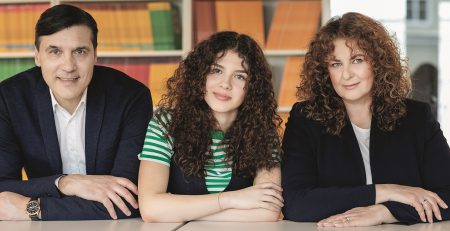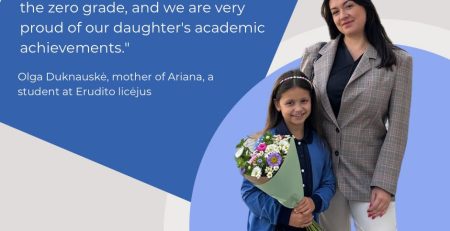History Teacher Aistė Oškinytė: “Historical Memory is the Condition for the Existence and Survival of Our Nation”
What is the significance of January 13th, Freedom Defenders’ Day? What does this date mean for Lithuania? How does it strengthen civic awareness, and why is it important to nurture historical memory and not forget important events for the country? Addressing these and other important questions about the cost of freedom, students discussed in classes, performed tasks related to Lithuania and freedom symbols, and debated during the ‘Erudito’ hour… We considered these questions with history teacher Aiste Oškinyte.
Celebrating Freedom Defenders’ Day at Erudito Licėjus, we remember why we are free: from the morning, candle flames dedicated to those who died for Lithuania’s freedom flickered in the classrooms, the Lithuanian national anthem, the famous freedom song “Laisvė”, echoed, students wore Lithuania’s freedom symbol – forget-me-nots – which they made themselves (some teachers adorned themselves with tricolor handmade sweaters), and in a moment of silence, they honored those who died for Lithuania’s freedom. A meaningful and warm morning started in the elementary classes: during a lesson dedicated to Freedom Defenders’ Day, witnesses of the events of January 13th, Saulėja’s family, and grandfather Gediminas participated. He even brought a poster to the lesson, which he held at rallies and during crucial events, saying, ‘Lithuania is free’. “Memory is alive because it bears witness”, we all say together, remembering those streets flooded with people.
What is the significance of January 13th, Freedom Defenders’ Day? How does the commemoration of January 13th differ from the observance of March 11th and February 16th?
Well, first of all, February 16th and March 11th are holidays for us – we celebrate these days as freedom days, as Lithuania’s birthdays. Our mood is uplifted, and we are festively inclined. January 13th, on the contrary, is a day of memory, a day of mourning. Every year, commemorating this day and remembering the people who sacrificed their lives for our freedom, tears accumulate, and we want to send the greatest gratitude to these people for their sacrifice for our Freedom.
What was the situation in Lithuania before and after the events of January 13, 1991?
Although Lithuania had declared its Independence, it was terrorized by the USSR, and our country was under pressure. However, determined to be free, the people of Lithuania did not want to give it up, and led by peaceful protests, they stood up to defend it. The situation changed after January 13th, primarily in a moral sense – the world saw that peacefully assembled people defending the most important strategic buildings were brutally attacked, and tanks rolled against unarmed people. This shocked the world, and Lithuania gained support.
Perhaps you or people in your close circle have memories associated with this day?
In 1991, I was not born yet. My family comes from a distant region of Lithuania, so they did not participate in the events in Vilnius. However, my grandfather with my two-year-old sister took part in the Baltic Way.
We can probably draw parallels with the events of January 13th and the current events in Ukraine?
Both the participants of January 13th and the people fighting in Ukraine are fighting for the same goal – the opportunity to be free.
How does the commemoration of January 13th strengthen civic awareness? Why is it important to nurture historical memory and not forget important events for the country?
Firstly, the people who participated in the events of January 13th show us all by their example how crucial our Homeland, Lithuania, is. Historical memory is the condition for the existence and survival of our nation. One of the most important characteristics of a nation is a shared history. Without a common history, it would be impossible to unite the nation for a common purpose.














